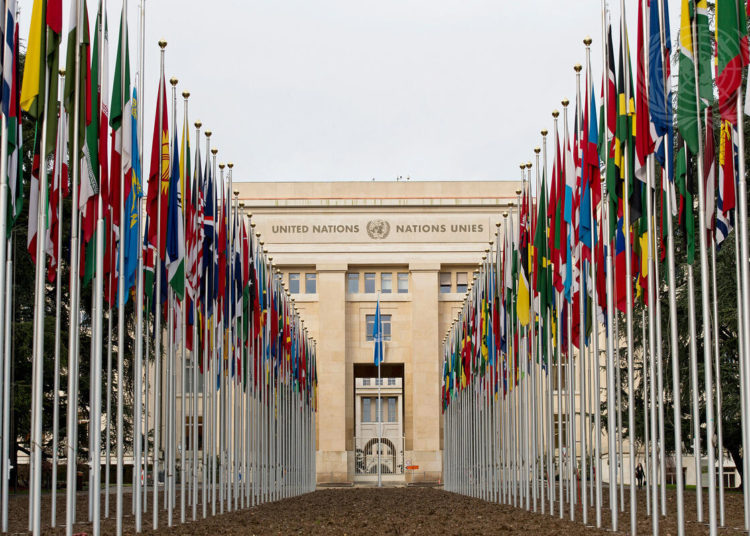Levent Kenez/Stockholm
The United Nations Human Rights Committee on November 15 released its decision on an application made by a teacher in Turkey who was detained and arrested over alleged terrorist links in 2018. Calling for the immediate release of the teacher, the committee’s decision will set a precedent for tens of thousands of terror suspects and people convicted and imprisoned on similar charges in the country.
Teacher Mukadder Alakuş was detained on September 4, 2018 on allegations that she was a member of the faith-based Gülen movement. Alakuş was not given food, water or medication for her daylong detention.
She was arrested the next day and sent to a prison in Eskişehir. In December 2018 a local court in Manisa sentenced Akkuş to seven years, six months in prison for membership in a terrorist organization. The court cited the fact that the suspect deposited money in the now-closed Bank Asya, downloaded the ByLock encrypted communication application and participated in a peaceful demonstration organized to protest the government as grounds for membership in the terrorist organization.

Turkish President Recep Tayyip Erdoğan first branded the Gülen movement as a terrorist organization in the aftermath of the December 2013 corruption investigations that incriminated him, his family members and his business and political associates in an Iran sanctions-busting scheme. He accused Fethullah Gülen, who inspires the movement, of initiating the graft probes, an accusation that Gülen denied.
The Turkish government also accuses the Gülen movement of orchestrating a controversial coup attempt on July 15, 2016. The movement, however, strongly denies any involvement.
The Turkish government accepted such activities as having an account at the Gülen-affiliated Bank Asya, holding an administrative position at a Gülen movement-linked institution, subscribing to the group’s publications, being a member of a trade union or other institution linked to the Gülen movement and using the encrypted messaging application ByLock as benchmarks for identifying and arresting tens of thousands of followers of the Gülen movement on charges of membership in a terrorist organization.
The UN Human Rights Committee, in its consideration of the merits, recalled that the notion of “arbitrariness” must be interpreted broadly to include elements of inappropriateness, injustice, lack of predictability and due process of law as well as elements of reasonableness, necessity and proportionality.
The committee noted that the Turkish government has only provided a partial copy of the court hearing of December 28, 2018, without providing any further documentation, such as an arrest warrant or detention order, regarding the evidence against Alakuş that would justify her detention.
“In these circumstances, the Committee considers that the State party has not demonstrated that the author’s detention met the criteria of reasonableness and necessity. The Committee therefore finds that the [author’s] detention amounted to a violation of her rights under article 9 (1) of the Covenant,” the committee decision reads.
The committee also said it cannot conclude that Akkuş’s alleged use of the ByLock application and Bank Asya account amounted to sufficiently clear and predictable criminal offenses at the time the acts took place. Many defendants with the same status as Alakuş used this determination of the UN committee in their defense during their trials but were unable to convince the courts.
The committee announced yet another decision that will set a precedent in terrorism trials in Turkey, considering that “as a matter of principle, the mere use or download of a means of encrypted communication or bank account cannot indicate, in itself, evidence of membership of an illegal armed organization, unless supported by other evidence, such as conversation records.”
The committee noted Alakuş’s allegations that she was unable to adequately prepare her defense; that she was denied access to the entire case file; that she was not permitted to call and cross-examine witnesses; that she was not allowed to attend her trial in person despite her request dated December 14, 2018; that the conduct of proceedings online and her displaced dentures impeded her from correctly expressing herself. The committee’s decision also said the Turkish government has not provided sufficient explanations or documentary evidence, such as full transcripts of the judicial proceedings, in order to substantiate its refutations of Alakuş’s allegations regarding her right to a fair trial.
The committee also noted that the defendant’s persistent request to be physically present in the courtroom and to make her defense was denied. Alakuş had to follow the hearings via a video conference system called SEGBİS, a violation of the right to a fair trial according to the committee.
One of the issues that the experts who evaluated the decision of the committee drew the most attention to is that the committee pointed out that the Turkish Constitutional Court is now a dysfunctional legal channel. The committee argued that in Alakuş’s case, the Turkish government did not show any evidence that an individual complaint to challenge the detention before the Constitutional Court would have been effective, in practice.
Likewise, former justice minister Sadullah Ergin said on November 2 that the European Court of Human Rights (ECtHR) might cancel the standing of Turkey’s Constitutional Court, which faces a barrage of individual applications, as a domestic remedy if the court does not issue rulings in line with the ECtHR.
Dr. Gökhan Güneş, a legal expert, on Sunday commented on the development in a series of tweets, saying that the committee’s decision, which directly concerns current proceedings in Turkey, was “historic.”
Hasan Dursun, a former prosecutor, stated on a YouTube program hosted by the Belgian-based TR724 news website that the UN committee had made several decisions in favor of defendants affiliated with the Gülen movement regarding arbitrary detentions and arrests in the past. “However, in that case, the committee examined the evidence for the first time,” he added.
According to Dursun, Turkey must implement the decisions of the UN committee in accordance with the international agreements and the International Covenant on Civil and Political Rights that Turkey committed to complying with as well as the decisions of the ECtHR.












